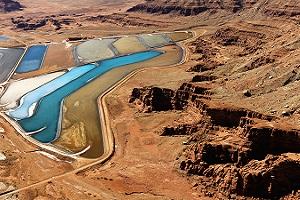
Today, the Inaugural Meeting of the Working Group on Tailings Safety and the Prevention of Accidental Water Pollution (IIWG) took place in Tajikistan, bringing together representatives of different national authorities, operators, international institutions and interested specialists to strengthen tailings safety in Tajikistan and beyond in Central Asia. The group agreed on the Terms of Reference of the IIWG and recommended its formal establishment under the government of Tajikistan. With this, Tajikistan is the first country in Central Asia to launch the establishment of such a working group.
The objective of the IIWG is to serve as a platform for and to improve inter-institutional coordination and cooperation among industrial safety, water, and other relevant authorities and institutions as well as with operators, academia and NGOs on preventing accidental water pollution with potential cross-border effects.
Tailings management facilities handle and store the fine-grained waste materials remaining after extracting minerals and metals from the earth, often containing toxic and hazardous substances.
Industrial accidents at these facilities, including their failures, can cause environmental catastrophes and transboundary water contamination with devastating effects on humans and the environment within and across countries. The devastating effects of such accidents were demonstrated not least by the tailings dam collapse in Brumadinho, Brazil in 2019 through which approximately 12 million cubic meters of mining waste were spilled, at least 259 people were killed and which caused 5 miles of destruction in the local town and countryside. TMF accidents also happen in the UNECE region. In 2016, mine tailings, containing cyanide and other hazardous substances, spilled into the Ulba and Filippovka Rivers following the failure of a water collector that was part of a TMF in the town of Ridder, Kazakhstan. The waste caused water pollution that prompted communities in distant towns along waterways in Kazakhstan and the Russian Federation, including in Omsk over 1,000 kilometers away, to take precaution. The tailings failure at Baia Mare, Romania in 2000, released 50 to 100 tonnes of cyanide, copper and other heavy metals, and caused huge transboundary water pollution and diminished fish stocks in Romania, Hungary and other downstream countries. The costs of clean-up operations for accidents at similar scales have been estimated at $170 million (US).
While preparedness and response to tailings accidents is important, the prevention of such accidents is key in the first place. Guidance for governments, competent authorities and operators is available, such as the UNECE Safety Guidelines and Good Practices for Tailings Management Facilities, the UNECE Online Toolkit and Training for Strengthening Mine Tailings Safety and the Global Industry Standard on Tailings Management. However, prevention can only be effective if disaster risks from tailings are known and jointly managed by all relevant stakeholders. As responsibilities for tailings safety and the prevention of water pollution are often spread across different ministries, institutions or committees and distributed from national to local levels, cross-sectoral and inter-institutional cooperation is crucial to prevent tailings failures and related accidental water pollution; Central Asian countries commonly mention this as an area for improvement. Also, industrial/tailings risks are not considered in river basin management plans in almost all UNECE countries. Countries need to have a platform to exchange relevant information on tailings risks, lessons learned from past accidents and to take joint action to prevent accidental water pollution from such facilities. Tajikistan expressed the need for such a platform for the first time at the Subregional workshop on strengthening tailings safety in Central Asia (20-21 November 2019). Hence, launching the IIWG now in Tajikistan is a significant step towards the enhancement of tailings risk management and the prevention of related accidental water pollution in Central Asia.
At today’s meeting, representatives from the following institutions in Tajikistan came together: Service of the State Supervision over the Safe Conduct of Work in Industry and Mining Supervision, Committee for Emergency Situations and Civil Defence, Committee on Environmental Protection, Committee of Emergency Situations and Civil Defence, Ministry of Industry and New Technologies, Ministry of Energy and Water Resources and Ministry of Foreign Affairs. They took stock of available information on tailings risks, such as the tailings hazard map developed under the UNECE Project on Strengthening Tailings Safety in Tajikistan (2019-2021), discussed challenges and agreed on the next steps to strengthen the safe management of tailings in the country. It is envisaged that the IIWG will meet on a needs-driven basis at least twice a year and make recommendations to further strengthen tailings risk governance in Tajikistan. This can be done by means including: reviewing/updating legislation and policies, discussing (international) good practices and their application in Tajikistan, discussing the impact of climate change and extreme weather events on the prevention of accidental water pollution from tailings, discussing how to best enhance safety at different types of sites, including Soviet legacy sites, and reviewing/updating self-assessments and action plans under the Industrial Accidents Convention. Further information about the inaugural meeting, organized with the support of the UNECE Convention on the Transboundary Effects of Industrial Accidents, is available at: https://unece.org/environmental-policy/events/inaugural-meeting-inter-institutional-working-group-tailings-safety-and
Taking this important step today is very timely. Tajikistan, like other Central Asian countries, is prone to so-called Natech accidents, i.e. technological accidents triggered by natural hazards (such as floods, landslides or earthquakes). This risk for Natech accidents is aggravated by changing weather patterns and more extreme weather events due to climate change. The IIWG can provide a forum for Tajikistan to exchange lessons learned from Natech accidents or near-misses at tailings facilities and agree on steps to improve the prevention of such accidents. Moreover, the projected increase of the global demand for minerals and metals will also equate to an increase in the number of mine tailings facilities. This calls for increased awareness and proactive measures to strengthen the safe management of mine tailings in Tajikistan, covering both new and existing tailings facilities.

